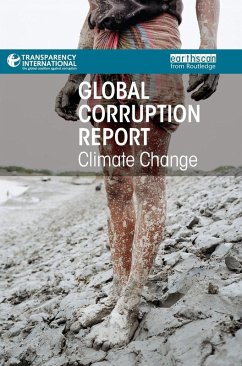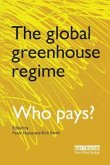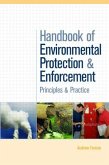Global Corruption Report
Climate Change
Herausgeber: International, Transparency
Global Corruption Report
Climate Change
Herausgeber: International, Transparency
- Gebundenes Buch
- Merkliste
- Auf die Merkliste
- Bewerten Bewerten
- Teilen
- Produkt teilen
- Produkterinnerung
- Produkterinnerung
First Published in 2011. Routledge is an imprint of Taylor & Francis, an informa company.
Andere Kunden interessierten sich auch für
![The Global Greenhouse Regime The Global Greenhouse Regime]() Kirk R SmithThe Global Greenhouse Regime197,99 €
Kirk R SmithThe Global Greenhouse Regime197,99 €![From Kyoto to the Town Hall From Kyoto to the Town Hall]() From Kyoto to the Town Hall197,99 €
From Kyoto to the Town Hall197,99 €![The Climate Bonus The Climate Bonus]() Alison SmithThe Climate Bonus197,99 €
Alison SmithThe Climate Bonus197,99 €![Handbook of Environmental Protection and Enforcement Handbook of Environmental Protection and Enforcement]() Andrew FarmerHandbook of Environmental Protection and Enforcement198,99 €
Andrew FarmerHandbook of Environmental Protection and Enforcement198,99 €![Flexibility in Global Climate Policy Flexibility in Global Climate Policy]() Tim JacksonFlexibility in Global Climate Policy126,99 €
Tim JacksonFlexibility in Global Climate Policy126,99 €![Climate Change Cooperation in Southern Africa Climate Change Cooperation in Southern Africa]() Climate Change Cooperation in Southern Africa126,99 €
Climate Change Cooperation in Southern Africa126,99 €![The Forest Ranger The Forest Ranger]() Herbert KaufmanThe Forest Ranger142,99 €
Herbert KaufmanThe Forest Ranger142,99 €-
-
-
First Published in 2011. Routledge is an imprint of Taylor & Francis, an informa company.
Hinweis: Dieser Artikel kann nur an eine deutsche Lieferadresse ausgeliefert werden.
Hinweis: Dieser Artikel kann nur an eine deutsche Lieferadresse ausgeliefert werden.
Produktdetails
- Produktdetails
- Verlag: Taylor & Francis
- Seitenzahl: 400
- Erscheinungstermin: 18. März 2011
- Englisch
- Abmessung: 242mm x 178mm x 22mm
- Gewicht: 771g
- ISBN-13: 9781849712972
- ISBN-10: 1849712972
- Artikelnr.: 32910851
- Herstellerkennzeichnung
- Libri GmbH
- Europaallee 1
- 36244 Bad Hersfeld
- gpsr@libri.de
- Verlag: Taylor & Francis
- Seitenzahl: 400
- Erscheinungstermin: 18. März 2011
- Englisch
- Abmessung: 242mm x 178mm x 22mm
- Gewicht: 771g
- ISBN-13: 9781849712972
- ISBN-10: 1849712972
- Artikelnr.: 32910851
- Herstellerkennzeichnung
- Libri GmbH
- Europaallee 1
- 36244 Bad Hersfeld
- gpsr@libri.de
Transparency International (TI) is the global civil society organisation leading the fight against corruption. Through more than 90 chapters worldwide and an international secretariat in Berlin, TI raises awareness of the damaging effects of corruption and works with partners in government, business and civil society to develop and implement effective measures to tackle it.
Preface. Foreword. Acknowledgements. Executive Summary 1. Introduction 1.0.
Defining the Challenge: Threats to Effective Climate Governance 1.1.
Mapping the Climate Change and Governance Challenge: The Big Picture 2. The
Climate Policy Framework: Examining the Effectiveness and Accountability of
Current Processes 2.0. The Climate Policy Framework: Examining the
Effectiveness and Accountability of Current Processes 2.1. From Global
Power Politics to Responsible Collective Governance: The Transparency and
Inclusiveness of International Climate Governance Institutions and
Processes 2.2. Essential Building Blocs for Kyoto and Beyond: Agreeing on
Climate Commitments at National and Regional Level 2.2.1. For Europe: Equal
Access, Unequal Voice: Business and NGO Lobbying on EU Climate Policy
2.2.2. For US: US Climate Policies: A Snapshot of Lobbyist Influence 2.3.
Urban Governance and Climate Change Policy 2.4. Vested or Public Interest?
The Matrix of Interests and Influence in Key Emerging Climate Countries
2.4.1. India 2.4.2. Climate Policies in China: a Gradual Move Towards
Ambition, More Transparency and Nascent Citizen Involvement 2.5. Climate
Policies in Austria: Poor Accountability Breeds Slow Progress 3. Key
Elements to Building Integrity in Decision-making 3.0. Key Elements to
Building Integrity in Decision-making 3.1. Climate Science: The World is
its Jury 3.2. Making Climate Governance Accountable: Reflections on what
can be Learned from International Environmental Governance 3.3. The Aarhus
Convention: A Blueprint for Inclusive and Accountable Climate Governance?
3.4. Civil Society and the Climate Change Process: How does Participation
Compare as a Measure of Transparency? 3.5. Holding Commitment to Account:
The Governance Dimension in Climate Change Measurement 3.6. Personal View:
A Fresh Approach to Climate Politics? 4. Ensuring Integrity and
Transparency in Climate Change Mitigation 4.0. Ensuring Integrity and
Transparency in Climate Change Mitigation 4.1. Greenhouse Gas Accounting: a
Foundation for Sound Climate Governance 4.2. Measuring, Reporting and
Verification of NAMAs and their Support: Considering Capacity, Corruption
and Commitments 4.3. The Trade-offs of Trade: Realities and Risks of Carbon
Markets 4.3.1 Slovak Public See No Credit in Government's Carbon Trading
4.3.2. Permit Politics: Hungary's CO2 Allowances 4.3.3. Shortcomings and
Shortcuts: Sri Lanka's Environmental Impact Assessments 4.3.4. Voluntary
Carbon Markets: Successes and Shortfalls 4.3.5. Sectoral Crediting: Getting
Governance Right from the Beginning 4.4. Climate Change: Corporate Change:
Shifting Business Models to Towards the Climate Agenda 4.5. Policy
Engagement: A Missing Link in Corporate Climate Reporting 4.5.1. Colombia:
Measuring Transparency Policies and Mechanisms in Public Utilities 4.6.
Enabling Green Choices: Ensuring Consumers Receive Accurate, Actionable
Information on the Climate Impacts of their Consumption Choices 4.7. Could
Corruption Pose a Barrier to Roll-out of Renewable Energy in North Africa?
4.7.1. Spain: Can Incentivising Solar Energy Invite Fraud? 4.8. Preventing
a Resource Curse Fuelled by the Green Economy 4.8.1. Bolivia's Lithium:
Opportunities and Challenges 4.9. Engineering the Earth: Considering
Accountability and the Last Resort 5. Adaptation to Climate Change:
Building Accountable, Sustainable Resilience 5.0. Adaptation to Climate
Change: Building Accountable Sustainable Resilience 5.1. Show me the Money:
Ensuring Equity, Transparency and Accountability in Adaptation Finance
5.1.1. Fast-start Funding: is There an Emerging Parallel Structure for
Climate Finance? 5.1.2. Climate Change Funds and Development: How to Ensure
Transparency and Access to Information on Funding Streams for Adaptation
5.2. Promoting an Effective and Transparent Use of Funds through the
Adaptation Fund 5.3. Climate-proofing Development: Corruption Risks in
Adaptation Infrastructure 5.3.1. Climate Change, Infrastructure and
Corruption 5.3.2. Climate-proofing and Political Influence in the
Philippines 5.4. Disrupting Lives: Climate Migration and Corruption 5.4.1
The Plunder of Kenya's Forests: Resettling the Settlers and Holding the
Loggers Accountable 5.4.2. Climate Change Adaptation and Water Integrity: A
Global Challenge to Address Local Realities 5.5. When Disaster Strikes:
Corruption and Rapid Response in Climate-related Relief and Recovery 6.
Forestry Governance: A Key Issue for Climate Change 6.1. Corruption: A Root
Cause of Deforestation and Forest Degradation 6.1.1. Climate Change and
Corruption Leave the World's Largest Mangrove Forest in Peril 6.2.
Governance in the World's Tropical Forests: Where Will REDD+ Land? 6.2.1.
Bosaw's: The 'Lung of Central America' Under Threat 6.3. Governance Risks
for REDD+: How Weak Forest Carbon Accounting can Create Opportunities for
Corruption and Fraud 6.3.1. Hypothetical Offsets - Real Corruption? Carbon
Offsets in Papua New Guinea 6.3.2. Is Norway Rocking the REDD Boat?
Defining the Challenge: Threats to Effective Climate Governance 1.1.
Mapping the Climate Change and Governance Challenge: The Big Picture 2. The
Climate Policy Framework: Examining the Effectiveness and Accountability of
Current Processes 2.0. The Climate Policy Framework: Examining the
Effectiveness and Accountability of Current Processes 2.1. From Global
Power Politics to Responsible Collective Governance: The Transparency and
Inclusiveness of International Climate Governance Institutions and
Processes 2.2. Essential Building Blocs for Kyoto and Beyond: Agreeing on
Climate Commitments at National and Regional Level 2.2.1. For Europe: Equal
Access, Unequal Voice: Business and NGO Lobbying on EU Climate Policy
2.2.2. For US: US Climate Policies: A Snapshot of Lobbyist Influence 2.3.
Urban Governance and Climate Change Policy 2.4. Vested or Public Interest?
The Matrix of Interests and Influence in Key Emerging Climate Countries
2.4.1. India 2.4.2. Climate Policies in China: a Gradual Move Towards
Ambition, More Transparency and Nascent Citizen Involvement 2.5. Climate
Policies in Austria: Poor Accountability Breeds Slow Progress 3. Key
Elements to Building Integrity in Decision-making 3.0. Key Elements to
Building Integrity in Decision-making 3.1. Climate Science: The World is
its Jury 3.2. Making Climate Governance Accountable: Reflections on what
can be Learned from International Environmental Governance 3.3. The Aarhus
Convention: A Blueprint for Inclusive and Accountable Climate Governance?
3.4. Civil Society and the Climate Change Process: How does Participation
Compare as a Measure of Transparency? 3.5. Holding Commitment to Account:
The Governance Dimension in Climate Change Measurement 3.6. Personal View:
A Fresh Approach to Climate Politics? 4. Ensuring Integrity and
Transparency in Climate Change Mitigation 4.0. Ensuring Integrity and
Transparency in Climate Change Mitigation 4.1. Greenhouse Gas Accounting: a
Foundation for Sound Climate Governance 4.2. Measuring, Reporting and
Verification of NAMAs and their Support: Considering Capacity, Corruption
and Commitments 4.3. The Trade-offs of Trade: Realities and Risks of Carbon
Markets 4.3.1 Slovak Public See No Credit in Government's Carbon Trading
4.3.2. Permit Politics: Hungary's CO2 Allowances 4.3.3. Shortcomings and
Shortcuts: Sri Lanka's Environmental Impact Assessments 4.3.4. Voluntary
Carbon Markets: Successes and Shortfalls 4.3.5. Sectoral Crediting: Getting
Governance Right from the Beginning 4.4. Climate Change: Corporate Change:
Shifting Business Models to Towards the Climate Agenda 4.5. Policy
Engagement: A Missing Link in Corporate Climate Reporting 4.5.1. Colombia:
Measuring Transparency Policies and Mechanisms in Public Utilities 4.6.
Enabling Green Choices: Ensuring Consumers Receive Accurate, Actionable
Information on the Climate Impacts of their Consumption Choices 4.7. Could
Corruption Pose a Barrier to Roll-out of Renewable Energy in North Africa?
4.7.1. Spain: Can Incentivising Solar Energy Invite Fraud? 4.8. Preventing
a Resource Curse Fuelled by the Green Economy 4.8.1. Bolivia's Lithium:
Opportunities and Challenges 4.9. Engineering the Earth: Considering
Accountability and the Last Resort 5. Adaptation to Climate Change:
Building Accountable, Sustainable Resilience 5.0. Adaptation to Climate
Change: Building Accountable Sustainable Resilience 5.1. Show me the Money:
Ensuring Equity, Transparency and Accountability in Adaptation Finance
5.1.1. Fast-start Funding: is There an Emerging Parallel Structure for
Climate Finance? 5.1.2. Climate Change Funds and Development: How to Ensure
Transparency and Access to Information on Funding Streams for Adaptation
5.2. Promoting an Effective and Transparent Use of Funds through the
Adaptation Fund 5.3. Climate-proofing Development: Corruption Risks in
Adaptation Infrastructure 5.3.1. Climate Change, Infrastructure and
Corruption 5.3.2. Climate-proofing and Political Influence in the
Philippines 5.4. Disrupting Lives: Climate Migration and Corruption 5.4.1
The Plunder of Kenya's Forests: Resettling the Settlers and Holding the
Loggers Accountable 5.4.2. Climate Change Adaptation and Water Integrity: A
Global Challenge to Address Local Realities 5.5. When Disaster Strikes:
Corruption and Rapid Response in Climate-related Relief and Recovery 6.
Forestry Governance: A Key Issue for Climate Change 6.1. Corruption: A Root
Cause of Deforestation and Forest Degradation 6.1.1. Climate Change and
Corruption Leave the World's Largest Mangrove Forest in Peril 6.2.
Governance in the World's Tropical Forests: Where Will REDD+ Land? 6.2.1.
Bosaw's: The 'Lung of Central America' Under Threat 6.3. Governance Risks
for REDD+: How Weak Forest Carbon Accounting can Create Opportunities for
Corruption and Fraud 6.3.1. Hypothetical Offsets - Real Corruption? Carbon
Offsets in Papua New Guinea 6.3.2. Is Norway Rocking the REDD Boat?
Preface. Foreword. Acknowledgements. Executive Summary 1. Introduction 1.0.
Defining the Challenge: Threats to Effective Climate Governance 1.1.
Mapping the Climate Change and Governance Challenge: The Big Picture 2. The
Climate Policy Framework: Examining the Effectiveness and Accountability of
Current Processes 2.0. The Climate Policy Framework: Examining the
Effectiveness and Accountability of Current Processes 2.1. From Global
Power Politics to Responsible Collective Governance: The Transparency and
Inclusiveness of International Climate Governance Institutions and
Processes 2.2. Essential Building Blocs for Kyoto and Beyond: Agreeing on
Climate Commitments at National and Regional Level 2.2.1. For Europe: Equal
Access, Unequal Voice: Business and NGO Lobbying on EU Climate Policy
2.2.2. For US: US Climate Policies: A Snapshot of Lobbyist Influence 2.3.
Urban Governance and Climate Change Policy 2.4. Vested or Public Interest?
The Matrix of Interests and Influence in Key Emerging Climate Countries
2.4.1. India 2.4.2. Climate Policies in China: a Gradual Move Towards
Ambition, More Transparency and Nascent Citizen Involvement 2.5. Climate
Policies in Austria: Poor Accountability Breeds Slow Progress 3. Key
Elements to Building Integrity in Decision-making 3.0. Key Elements to
Building Integrity in Decision-making 3.1. Climate Science: The World is
its Jury 3.2. Making Climate Governance Accountable: Reflections on what
can be Learned from International Environmental Governance 3.3. The Aarhus
Convention: A Blueprint for Inclusive and Accountable Climate Governance?
3.4. Civil Society and the Climate Change Process: How does Participation
Compare as a Measure of Transparency? 3.5. Holding Commitment to Account:
The Governance Dimension in Climate Change Measurement 3.6. Personal View:
A Fresh Approach to Climate Politics? 4. Ensuring Integrity and
Transparency in Climate Change Mitigation 4.0. Ensuring Integrity and
Transparency in Climate Change Mitigation 4.1. Greenhouse Gas Accounting: a
Foundation for Sound Climate Governance 4.2. Measuring, Reporting and
Verification of NAMAs and their Support: Considering Capacity, Corruption
and Commitments 4.3. The Trade-offs of Trade: Realities and Risks of Carbon
Markets 4.3.1 Slovak Public See No Credit in Government's Carbon Trading
4.3.2. Permit Politics: Hungary's CO2 Allowances 4.3.3. Shortcomings and
Shortcuts: Sri Lanka's Environmental Impact Assessments 4.3.4. Voluntary
Carbon Markets: Successes and Shortfalls 4.3.5. Sectoral Crediting: Getting
Governance Right from the Beginning 4.4. Climate Change: Corporate Change:
Shifting Business Models to Towards the Climate Agenda 4.5. Policy
Engagement: A Missing Link in Corporate Climate Reporting 4.5.1. Colombia:
Measuring Transparency Policies and Mechanisms in Public Utilities 4.6.
Enabling Green Choices: Ensuring Consumers Receive Accurate, Actionable
Information on the Climate Impacts of their Consumption Choices 4.7. Could
Corruption Pose a Barrier to Roll-out of Renewable Energy in North Africa?
4.7.1. Spain: Can Incentivising Solar Energy Invite Fraud? 4.8. Preventing
a Resource Curse Fuelled by the Green Economy 4.8.1. Bolivia's Lithium:
Opportunities and Challenges 4.9. Engineering the Earth: Considering
Accountability and the Last Resort 5. Adaptation to Climate Change:
Building Accountable, Sustainable Resilience 5.0. Adaptation to Climate
Change: Building Accountable Sustainable Resilience 5.1. Show me the Money:
Ensuring Equity, Transparency and Accountability in Adaptation Finance
5.1.1. Fast-start Funding: is There an Emerging Parallel Structure for
Climate Finance? 5.1.2. Climate Change Funds and Development: How to Ensure
Transparency and Access to Information on Funding Streams for Adaptation
5.2. Promoting an Effective and Transparent Use of Funds through the
Adaptation Fund 5.3. Climate-proofing Development: Corruption Risks in
Adaptation Infrastructure 5.3.1. Climate Change, Infrastructure and
Corruption 5.3.2. Climate-proofing and Political Influence in the
Philippines 5.4. Disrupting Lives: Climate Migration and Corruption 5.4.1
The Plunder of Kenya's Forests: Resettling the Settlers and Holding the
Loggers Accountable 5.4.2. Climate Change Adaptation and Water Integrity: A
Global Challenge to Address Local Realities 5.5. When Disaster Strikes:
Corruption and Rapid Response in Climate-related Relief and Recovery 6.
Forestry Governance: A Key Issue for Climate Change 6.1. Corruption: A Root
Cause of Deforestation and Forest Degradation 6.1.1. Climate Change and
Corruption Leave the World's Largest Mangrove Forest in Peril 6.2.
Governance in the World's Tropical Forests: Where Will REDD+ Land? 6.2.1.
Bosaw's: The 'Lung of Central America' Under Threat 6.3. Governance Risks
for REDD+: How Weak Forest Carbon Accounting can Create Opportunities for
Corruption and Fraud 6.3.1. Hypothetical Offsets - Real Corruption? Carbon
Offsets in Papua New Guinea 6.3.2. Is Norway Rocking the REDD Boat?
Defining the Challenge: Threats to Effective Climate Governance 1.1.
Mapping the Climate Change and Governance Challenge: The Big Picture 2. The
Climate Policy Framework: Examining the Effectiveness and Accountability of
Current Processes 2.0. The Climate Policy Framework: Examining the
Effectiveness and Accountability of Current Processes 2.1. From Global
Power Politics to Responsible Collective Governance: The Transparency and
Inclusiveness of International Climate Governance Institutions and
Processes 2.2. Essential Building Blocs for Kyoto and Beyond: Agreeing on
Climate Commitments at National and Regional Level 2.2.1. For Europe: Equal
Access, Unequal Voice: Business and NGO Lobbying on EU Climate Policy
2.2.2. For US: US Climate Policies: A Snapshot of Lobbyist Influence 2.3.
Urban Governance and Climate Change Policy 2.4. Vested or Public Interest?
The Matrix of Interests and Influence in Key Emerging Climate Countries
2.4.1. India 2.4.2. Climate Policies in China: a Gradual Move Towards
Ambition, More Transparency and Nascent Citizen Involvement 2.5. Climate
Policies in Austria: Poor Accountability Breeds Slow Progress 3. Key
Elements to Building Integrity in Decision-making 3.0. Key Elements to
Building Integrity in Decision-making 3.1. Climate Science: The World is
its Jury 3.2. Making Climate Governance Accountable: Reflections on what
can be Learned from International Environmental Governance 3.3. The Aarhus
Convention: A Blueprint for Inclusive and Accountable Climate Governance?
3.4. Civil Society and the Climate Change Process: How does Participation
Compare as a Measure of Transparency? 3.5. Holding Commitment to Account:
The Governance Dimension in Climate Change Measurement 3.6. Personal View:
A Fresh Approach to Climate Politics? 4. Ensuring Integrity and
Transparency in Climate Change Mitigation 4.0. Ensuring Integrity and
Transparency in Climate Change Mitigation 4.1. Greenhouse Gas Accounting: a
Foundation for Sound Climate Governance 4.2. Measuring, Reporting and
Verification of NAMAs and their Support: Considering Capacity, Corruption
and Commitments 4.3. The Trade-offs of Trade: Realities and Risks of Carbon
Markets 4.3.1 Slovak Public See No Credit in Government's Carbon Trading
4.3.2. Permit Politics: Hungary's CO2 Allowances 4.3.3. Shortcomings and
Shortcuts: Sri Lanka's Environmental Impact Assessments 4.3.4. Voluntary
Carbon Markets: Successes and Shortfalls 4.3.5. Sectoral Crediting: Getting
Governance Right from the Beginning 4.4. Climate Change: Corporate Change:
Shifting Business Models to Towards the Climate Agenda 4.5. Policy
Engagement: A Missing Link in Corporate Climate Reporting 4.5.1. Colombia:
Measuring Transparency Policies and Mechanisms in Public Utilities 4.6.
Enabling Green Choices: Ensuring Consumers Receive Accurate, Actionable
Information on the Climate Impacts of their Consumption Choices 4.7. Could
Corruption Pose a Barrier to Roll-out of Renewable Energy in North Africa?
4.7.1. Spain: Can Incentivising Solar Energy Invite Fraud? 4.8. Preventing
a Resource Curse Fuelled by the Green Economy 4.8.1. Bolivia's Lithium:
Opportunities and Challenges 4.9. Engineering the Earth: Considering
Accountability and the Last Resort 5. Adaptation to Climate Change:
Building Accountable, Sustainable Resilience 5.0. Adaptation to Climate
Change: Building Accountable Sustainable Resilience 5.1. Show me the Money:
Ensuring Equity, Transparency and Accountability in Adaptation Finance
5.1.1. Fast-start Funding: is There an Emerging Parallel Structure for
Climate Finance? 5.1.2. Climate Change Funds and Development: How to Ensure
Transparency and Access to Information on Funding Streams for Adaptation
5.2. Promoting an Effective and Transparent Use of Funds through the
Adaptation Fund 5.3. Climate-proofing Development: Corruption Risks in
Adaptation Infrastructure 5.3.1. Climate Change, Infrastructure and
Corruption 5.3.2. Climate-proofing and Political Influence in the
Philippines 5.4. Disrupting Lives: Climate Migration and Corruption 5.4.1
The Plunder of Kenya's Forests: Resettling the Settlers and Holding the
Loggers Accountable 5.4.2. Climate Change Adaptation and Water Integrity: A
Global Challenge to Address Local Realities 5.5. When Disaster Strikes:
Corruption and Rapid Response in Climate-related Relief and Recovery 6.
Forestry Governance: A Key Issue for Climate Change 6.1. Corruption: A Root
Cause of Deforestation and Forest Degradation 6.1.1. Climate Change and
Corruption Leave the World's Largest Mangrove Forest in Peril 6.2.
Governance in the World's Tropical Forests: Where Will REDD+ Land? 6.2.1.
Bosaw's: The 'Lung of Central America' Under Threat 6.3. Governance Risks
for REDD+: How Weak Forest Carbon Accounting can Create Opportunities for
Corruption and Fraud 6.3.1. Hypothetical Offsets - Real Corruption? Carbon
Offsets in Papua New Guinea 6.3.2. Is Norway Rocking the REDD Boat?








